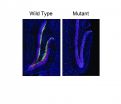UMN research pinpoints microRNA tied to colon cancer tumor growth
2014-10-01
(Press-News.org) MINNEAPOLIS/ST PAUL (October 1, 2014) – Researchers at the University of Minnesota have identified microRNAs that may cause colon polyps from turning cancerous. The finding could help physicians provide more specialized, and earlier, treatment before colon cancer develops.
The findings are published today in The Journal of Pathology.
The American Cancer Society estimates over 134,000 people will be diagnosed with colon cancer in 2014, despite the expanded screening processes now available. This year alone, about 50,000 people will die because of the disease.
Research was led by Subbaya Subramanian, Ph.D., assistant professor in the Division of Basic and Translational Research in the Department of Surgery in the University of Minnesota Medical School and member of the Masonic Cancer Center, University of Minnesota.
"With the advanced screenings we now have available, why are so many people still being diagnosed with colon cancer? We really wanted to understand if there was a way to stop the disease before it starts, before benign polyps became cancerous tumors," said Subramanian.
By looking at microRNA, Subramanian and his colleagues hoped to unlock what pieces were present in colon polyps that developed into cancer. They found miR-182 and miR-503 work together to transform a benign polyp to a cancerous tumor by holding down the cell's ability to create the tumor suppressing protein FBXW7.
This was determined by looking at a benign polyp cell line. In this line, miR-182 was present and appeared as a feature of the creation of adenomas, or polyps. Researchers then introduced miR-503 to the cell line and noted the partnership limited the tumor suppressing protein and polyps had a much higher potential for becoming cancerous.
Armed with this knowledge, the researchers then took a closer look at actual patient data. They examined the expression of miR-182 and miR-503 in colon cancer patients with a 12-year survival outcome data. When both microRNAs were present at higher levels, decreased patient survival was clearly correlated.
"It suggests a biomarker for colon cancer patients, something ideally physicians can one day screen for as a diagnostic and prognostic tool," said Subramanian.
Subramanian believes the next step will be determining if drugs are able to target miR-182 and -503, as well was what miR-182 and -503 do after suppressing FBXW7. He hopes to develop a clinical test as well as a translational target for treatments to be utilized in a clinical setting.
INFORMATION:
This study was supported by the Department of Surgery, University of Minnesota Medical School. Patient sets were utilized in partnership with the Mayo Clinic, Rochester, MN.
The University of Minnesota Medical School, with its two campuses in the Twin Cities and Duluth, is a leading educator of the next generation of physicians. Our graduates and the school's 3,800 faculty physicians and scientists advance patient care, discover biomedical research breakthroughs with more than $180 million in sponsored research annually, and enhance health through world-class patient care for the state of Minnesota and beyond. Visit http://www.med.umn.edu to learn more.
Masonic Cancer Center, University of Minnesota is part of the University's Academic Health Center. It is designated by the National Cancer Institute as a Comprehensive Cancer Center. For more information about the Masonic Cancer Center, visit http://www.cancer.umn.edu or call 612-624-2620.
ELSE PRESS RELEASES FROM THIS DATE:
2014-10-01
New Rochelle, NY, October 1, 2014—The cause of fibromyalgia, a chronic pain syndrome is not known. However, the results of a new study that compares brain activity in individuals with and without fibromyalgia indicate that decreased connectivity between pain-related and sensorimotor brain areas could contribute to deficient pain regulation in fibromyalgia, according to an article published in Brain Connectivity, a peer-reviewed journal from Mary Ann Liebert, Inc., publishers. The article is available free on the Brain Connectivity website at http://online.liebertpub.com/doi/full/10.1089/brain.2014.0274 ...
2014-10-01
Along rivers in Tennessee and Georgia, scientists have been studying brownish-orange spiders, called Anelosimus studiosus, that make cobwebby nests "anywhere from the size of a golf ball to the size of a Volkswagen Beetle," researcher Jonathan Pruitt says. The individual spiders are only the size of a pencil eraser, but they form organized groups that can catch prey ranging from fruit flies to small vertebrates. "We have found carcasses of rats and birds inside their colonies," Pruitt says. Unlike most spiders, which are solitary, these social spiders work together in groups.
Now ...
2014-10-01
COLUMBIA, Mo. – Breathing oxygen helps the body create energy for its cells. As a result of the breathing process, reactive molecules called "free radicals" are produced that often cause damage to proteins and genes found in cells. This damage is known as oxidative stress. Free radicals also have been linked to cancer, Alzheimer's and Parkinson's disease. Now, investigators at the University of Missouri have discovered a molecule that treats oxidative stress.
"Oxidative stress can cause damage to the building blocks of a cell, resulting in excessive cell proliferation, ...
2014-10-01
For older adults, being unable to identify scents is a strong predictor of death within five years, according to a study published October 1, 2014, in the journal PLOS ONE. Thirty-nine percent of study subjects who failed a simple smelling test died during that period, compared to 19 percent of those with moderate smell loss and just 10 percent of those with a healthy sense of smell.
The hazards of smell loss were "strikingly robust," the researchers note, above and beyond most chronic diseases. Olfactory dysfunction was better at predicting mortality than a diagnosis ...
2014-10-01
ALEXANDRIA, VA — The American Academy of Otolaryngology—Head and Neck Surgery Foundation has released the first ever mutli-disciplinary, evidence-based clinical practice guideline to improve the diagnosis and management of tinnitus, the perception of sound—often ringing—without an external sound source. The guideline was published today in the journal Otolaryngology–Head and Neck Surgery.
"Tinnitus affects 10-15% of adults in the United States. It is the most common service-related disability among our military veterans. Yet despite its prevalence and effect on quality ...
2014-10-01
For older adults, being unable to identify scents may be a predictor of mortality within five years, according to a study published October 1, 2014, in the journal PLOS ONE by Jayant Pinto from The University of Chicago and colleagues.
The study was part of the National Social Life, Health and Aging Project (NSHAP), the first in-home study of social relationships and health in a large, nationally representative sample of men and women ages 57 to 85. Researchers first surveyed 3,000 participants in 2005-06, assessing their ability to identify five distinct common odors, ...
2014-10-01
Studying mice with a genetic change similar to what is found in Kabuki syndrome, a inherited disease of humans, Johns Hopkins researchers report they have used an anticancer drug to "open up" DNA and improve mental function.
Along with a potential treatment for the intellectual disability seen in Kabuki syndrome, the study's findings also suggest a new way of thinking about a category of genetic diseases known as Mendelian disorders of the epigenetic machinery, the researchers say. In these disorders, a genetic mutation causes errors in the way proteins and chemicals ...
2014-10-01
Researchers have identified a molecular mechanism that could explain why the common cold can bring on life-threatening asthma attacks.
Published today in Science Translational Medicine, the findings indicate this may be a potential target for new drugs that could be more effective than existing treatments.
Viruses that infect the airways are the most common cause of asthma attacks, accounting for 80-90 per cent of cases. The great majority of these are rhinoviruses, which are the predominant cause of the common cold.
Although illnesses caused by rhinoviruses are ...
2014-10-01
Scientists at the University of Southampton have discovered that a region on the front surface of the eye harbours special stem cells that could treat blinding eye conditions.
This part of the eye is called the 'corneal limbus' and is a narrow gap lying between the transparent cornea and white sclera.
The research, published in PLOS ONE, showed that stem cells can be cultured from the corneal limbus in vitro. Under the correct culture conditions, these cells could be directed to behave like the cells needed to see light - photoreceptor cells.
The loss of photoreceptors ...
2014-10-01
Researchers at UC San Francisco and Rush University Medical Center, Chicago, may have found a predictor for a disorder affecting kidney transplant recipients that can accelerate organ failure, a discovery that eventually could allow for customized therapies and improved patient selection for transplant.
The study of focal segmental glomerulosclerosis (FSGS), a devastating form of kidney disease, is in the Oct. 1 issue of Science Translational Medicine. Research was conducted by an international study team, with Necker Hospital in Paris and UCSF joint lead authors and ...
LAST 30 PRESS RELEASES:
[Press-News.org] UMN research pinpoints microRNA tied to colon cancer tumor growth




